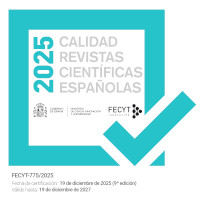MONOGRAPHIC: RADIO IN TRANSFORMATION: CONTEMPORARY PERSPECTIVES AND CHALLENGES
Call for Papers
The contemporary radio industry is going through a process of profound transformation driven by technological evolution and media convergence. The shift from traditional broadcasting to digital models has reshaped both the production and consumption of audio content. The incorporation of technologies such as digital broadcasting, Internet Protocol (IP) audio and smart speakers has expanded distribution spaces, shifting radio from a stand-alone medium to a more complex multi-platform ecosystem (Hallett, 2021).
The adoption of streaming platforms, the proliferation of podcasts and the integration of audiovisual content have ceased to be mere strategic options and have become necessary conditions for survival and competitiveness in the radio market. This diversification process not only expands monetisation opportunities, e.g. through new advertising formats, but also strengthens connectivity with fragmented and mobile audiences (Kustiawan et al., 2024; Pavlik, 2015).
However, the same technological advancement poses relevant challenges. Competition with multiple sources of digital entertainment has made it difficult to retain audiences, especially in the younger segments, which prefer personalised and on-demand formats. Faced with this, the radio industry is forced to design innovative programming and marketing strategies capable of responding to digital consumption habits and capturing the attention of audiences migrating to online audio services (Abramson, 2014).
Another crucial challenge is the preservation of content quality in an environment dominated by immediacy and information saturation. The incorporation of artificial intelligence (AI) and big data analysis offer significant advantages, such as content personalisation or optimisation of broadcast schedules (Azahra et al., 2024). However, these tools also require a critical analysis of their ethical and legal implications, particularly in terms of user privacy and transparency in content selection (Madaki et al., 2024; Parnis, 2000).
The regulatory framework thus becomes strategically important to ensure that broadcasting continues to fulfil a key social function: promoting democratic governance, accountability and the inclusion of traditionally marginalised voices (Buckley et al., 2008). Maintaining this public engagement involves balancing technological innovation with standards.
References:
Abramson, J. D. (2014). Radio: Reaching young adult audiences. What are the challenges and opportunities for radio programmers in cultivating young adult audiences in the current media environment? (Tesis de maestría, San José State University). Master's Theses, 4447. https://doi.org/10.31979/etd.jj2m-tzd2
Azahra, A. S., binti Abdullah Suhaimi, N., & Yuningsih, S. H. (2024). Modern Broadcasting: Leveraging Artificial Intelligence and Big Data for More Personalized Content. International Journal of Linguistics, Communication, and Broadcasting, 2(2), 39–45. https://doi.org/10.46336/ijlcb.v2i2.108
Buckley, S., Duer, K., Mendel, T., & Ó Siochrú, S. (2008). Broadcasting, voice, and accountability: A public interest approach to policy, law, and regulation. World Bank and University of Michigan Press.
Hallett, L. (2021). Broadcasting: Technology, challenges and opportunities in the 21st century. Interacciones: Estudios en Comunicación y Cultura, 12(1), 17–37. https://doi.org/10.1386/iscc_00034_1
Kustiawan, W., Dinar, Y. P., Salsabila, K., Apsyara, T., Al-Qadri, M. S., & Ritonga, N. H. (2024). Strategi penyiaran radio komersial di era digitalisasi. Katalis Pendidikan: Jurnal Ilmu Pendidikan dan Matematika, 1(3), 104–111. https://doi.org/10.62383/katalis.v1i3.550
Madaki, W., Kaigama, K., & Ayagwa, F. (2024). Issues in Broadcasting and Technological Determinism: A Review. International Journal of Humanities, Education, and Social Sciences, 2(2), 231-248. https://doi.org/10.58578/ijhess.v2i2.3301
Parnis, D. (2000). Tuning in the Future: Digital Technology and Commercial Radio Broadcasting in Canada. Journal of Canadian Studies, 35(3), 231–250. https://doi.org/10.3138/JCS.35.3.231
Pavlik, J.V. (Ed.). (2015). Digital Technology and the Future of Broadcasting: Global Perspectives (1st ed.). Routledge. https://doi.org/10.4324/9781315709772
Sub-themes
We welcome papers that address emerging technological trends, convergence with other media platforms, and new forms of personalisation and interactivity with audiences.
Research on the future of radio writing and the training of professionals, as well as critical studies on the use of artificial intelligence in content production and management, will also be considered.
The monograph also aims to include reflections on legal and ethical issues linked to broadcasting, as well as analyses of the role of marketing and advertising in the contemporary radio space.
The aim is to offer a comprehensive and up-to-date vision of radio in the digital era, fostering a rigorous and interdisciplinary academic dialogue.
Coordinators:
Carlos López Olano
Professor of the Department of Language Theory and Communication Sciences at the University of Valencia. His line of research focuses on the development of podcasting within the communication landscape, on public television -especially on the protection of news within the European environment- and on the new possibilities opened up in this field by multiplatform and transmedia technologies and the communicative implications related to democratic memory.
Andrej Brník
Slovak media expert and educator working at the Faculty of Mass Media Communication at UCM in Trnava, where he studied mass media communication. In his final theses, he focused on media education, standards, and the influence of the media. He has been working at the faculty since 2015. He has held several positions, including director of the student radio station Aetter.sk, whose graduates often find employment in Slovak radio stations. As vice-dean for development and PR, he led the faculty's promotional activities. His research focuses on radio broadcasting, especially student radio stations, their social significance, contribution to media education and the formation of cultural identity. He also examines the ethical and legal aspects of media communication. In addition to his academic activities, he is involved in organizing major events such as the SIAF International Air Show and the Aviation Festival in Piešťany. He is interested in radio, sound, media education, and practical creation (advertising, jingles).
Ľubica Janáčková
Professor at the Faculty of Mass Communication at the University of Ss. Cyril and Methodius. Her research focuses on the creation and development of student media, the functioning of editorial offices, and the challenges, advantages, and disadvantages they face. As part of her academic activities, she organizes workshops aimed at supporting the growth and improvement of student media. In addition to her academic work, she is also active as a radio reporter.
Deadline for submission of articles: March 13, 2026
Publication date: June 2026























